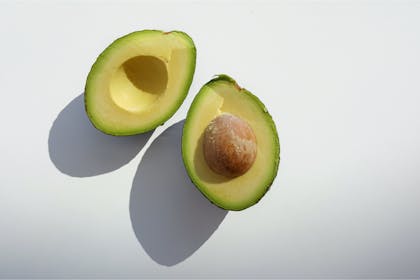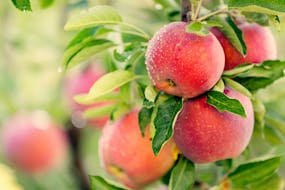Can babies eat avocado?

Find out when it’s safe to give your baby avocado, plus get tips on introducing avocado to your baby, and info on allergies.
This page contains affiliate links, which means we may earn a small amount of money if a reader clicks through and makes a purchase. All our articles and reviews are written independently by the Netmums editorial team.
The official advice on when babies can eat avocado
According to the NHS, babies can eat avocado from around six months old, along with other soft-cooked fruit and vegetables.
Once you start slowly introducing solid foods to your baby (often called ‘weaning’), it’s best to continue giving them breast or formula milk alongside a healthy and varied diet.
When it comes to weaning, there are two techniques you can use, and many parents opt for a combination of both.
FREE NEWBORN NAPPIES
Firstly, there’s spoon feeding which is seen as the more ‘traditional’ weaning method. It involves pureeing foods until smooth and then spoon-feeding your baby (or feeding purees from a jar or pouch).
The second weaning technique is baby-led weaning (BLW) which is based on the idea that your baby can feed themselves with finger foods, eating when they’re hungry and stopping when they’re full.
Since ripe avocado has a soft, creamy, and sliceable texture, it makes a great first food for babies, whether you choose baby-led weaning, spoon feeding, or both.
Plus, as well as being easy to prepare, avocado is loaded with healthy fats to support your baby’s growth.

How to prepare avocado for your baby
Here are a few recipes and preparation suggestions for serving avocado to your baby:
Preparing avocado for baby-led weaning
Start by picking a ripe avocado. These usually have a darker skin colour and a slightly soft flesh.
If the avocado isn’t ripe, it could be a potential choking hazard. However, if it’s too ripe, it might not hold its shape well in the baby’s hand.
Cut the avocado in half (lengthwise), remove the seed, and peel the fruit by sliding your thumb under the skin and peeling the skin back.
Then, cut the avocado flesh into strips or large spears for your baby to pick up and enjoy.
If the avocado spears are too slippery for your baby to hold, you could leave some of the skin on, making it easier for them to grasp. This way, they can hold the peel and eat the inside of the sliced avocado, which is perfect for baby-led weaning.
At nine to 12 months, your baby will start to develop the pincer grasp (where the thumb and pointer finger meet), enabling them to pick up smaller, bite-size pieces of food by themselves. So, at this age, you could even try moving down in size to smaller chunks of avocado.
Preparing avocado for spoon feeding
For babies between the ages of six to nine months, you could begin by serving them avocado puree with a spoon (simply mash the fruit with your hands, a fork, or a potato masher). This is a quick and easy way to make a chunky or smooth puree for your baby.
Similarly, another great option for spoon feeding is avocado mash (blended with half a banana) which is an easy no-cook recipe for weaning babies. This is a great one for babies who love smooth and creamy textures. Plus, it couldn’t be much quicker to make.
Can avocado help relieve constipation in babies?
Health and wellness experts often recommend mashed or pureed avocado as a helpful food for relieving constipation in babies.
This is because avocado contains large amounts of fibre, which helps babies (and adults) maintain a healthy digestive system.
While your baby’s bowel movements will change as they grow (and there’s no ‘normal’ when it comes to how often babies poo), the NHS notes that on average, newborn babies poo about four times a day, whereas one-year-olds poo about twice a day.
When your baby starts solid foods, at around six months, you should expect a change in nappy contents. This is because their body is learning how to cope with digesting new things.
Experts explain that some babies may become constipated when you first start introducing solid foods to them. This normally settles once their digestive system adjusts to regularly having solid food.
According to the NHS, signs of constipation in babies include:
- Pooing fewer than 3 times in a week
- Finding it difficult to poo, and poos that are larger than usual
- Dry, hard, lumpy or pellet-like poos
- Unusually smelly wind and poo
- Your baby may be less hungry than usual
- Their tummy might feel firm
If your baby is constipated, you might notice them straining a lot and crying more than usual, and the poos are small and hard, like rabbit droppings, or much harder than normal (for more information, here’s everything you need to know about your baby’s poo).
If this is the case, and especially if there's blood in the stool, speak to a doctor or health visitor so they can check for possible causes.
Treatment will depend on your baby's age and stage. You can also help prevent constipation in older babies and toddlers with fruit in their diet – including avocado, as it’s easy to digest and can help give your baby the kick start they need.
Health benefits of avocado
Avocado is rich in fibre and healthy fats. It’s also a fantastic source of growth-supportive B vitamins such as folate and B6. And although it contains saturated fats, avocado is a no-cholesterol food item.
Packed with lots of vitamins and minerals, avocado also contains vitamins C, E, and K, magnesium, zinc, and manganese.
What’s more, the fruit has anti-inflammatory and anti-microbial properties which can help to protect babies from common health conditions – strengthening the immune system and promoting restoration of the body.
Could my baby be allergic to avocado?
Yes, but it’s unlikely. Avocado allergies are rare, but they’re more likely to occur in babies and children who are already allergic to banana, chestnut, kiwi, papaya, certain pollens or latex.
If your baby has an allergic reaction after eating avocado, it’s possible they have an oral avocado allergy, which can cause mild to severe allergy symptoms, such as itching of the lips, mouth, and throat.
As with any new food, you should look out for the signs and symptoms of a possible allergic reaction. And start by slowly introducing a small quantity of the food into their existing diet.
It's a good idea to introduce foods that can cause an allergy one at a time, with several days between them. That way, if your baby does have a reaction, you'll know which food caused it.
According to the NHS, the main foods that can cause an allergy are:
- cows' milk
- eggs
- foods that contain gluten, including wheat, barley and rye
- nuts and peanuts (serve them crushed or ground)
- seeds (serve them crushed or ground)
- soya
- shellfish (don't serve raw or lightly cooked)
- fish
So try to avoid giving any of these other foods at the same time as you give your baby avocado for the first time.
Signs of allergies in babies
According to the NHS, allergic reactions usually happen quickly, within a few minutes of exposure to an allergen.
If your baby does have an allergy, you might notice some of the following symptoms:
- Sneezing
- A runny or blocked nose
- Red, itchy, watery eyes
- Wheezing and coughing
- A red, itchy rash
- Worsening of asthma or eczema symptoms
What should I do if I think my baby has an allergy?
If you think your baby may have an allergy, speak to your health visitor or GP, who may refer you to a registered dietitian. If the reaction is mild, don't cut important foods out of your baby's diet until you've received medical advice, as your baby could miss out on important nutrients.
If you think your child is suffering from a severe allergic reaction, seek urgent medical attention.
For peer-to-peer support, can chat about your child’s allergies and intolerances with other parents in the forum.
Related stories
For more support and advice on baby food, weaning and tips to help make mealtimes easier, check out our stories below or chat to other parents in the forum.
CHAT: What are your best weaning tips/advice?
How to prevent your avocados from turning brown





